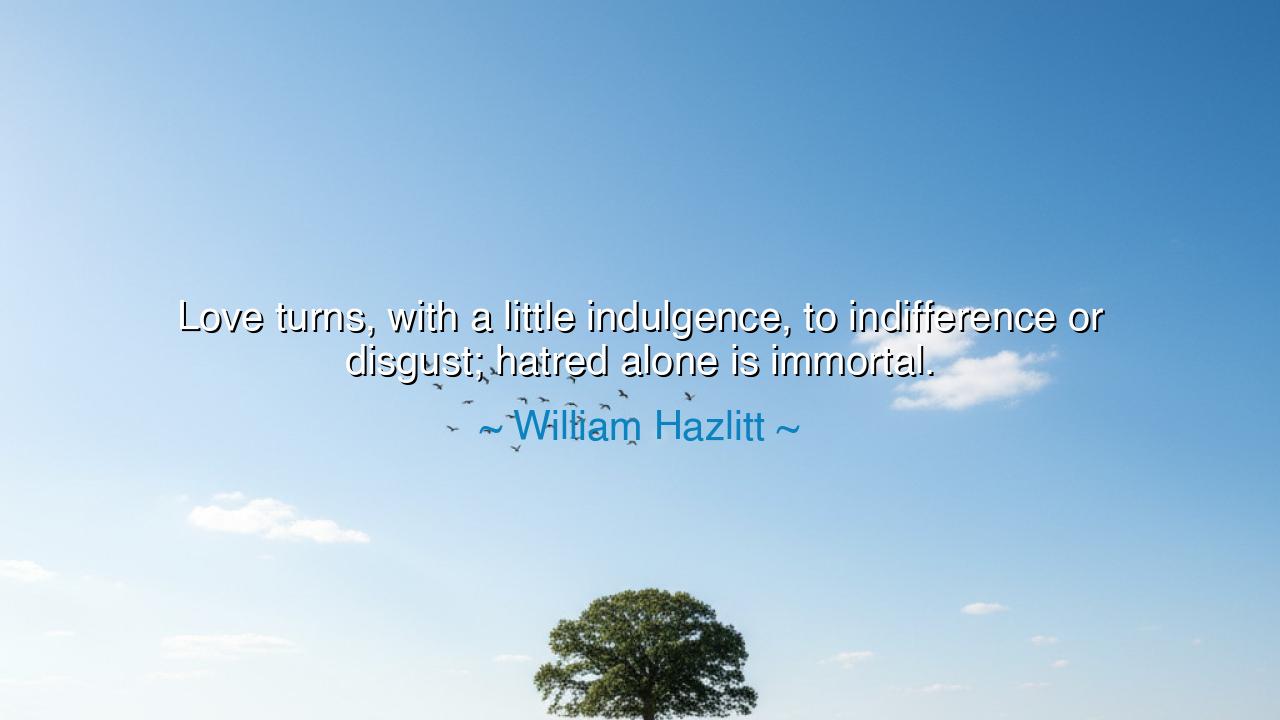
Love turns, with a little indulgence, to indifference or disgust;
Love turns, with a little indulgence, to indifference or disgust; hatred alone is immortal.






“Love turns, with a little indulgence, to indifference or disgust; hatred alone is immortal.” — thus wrote William Hazlitt, the English essayist and philosopher of the early nineteenth century, whose pen could pierce as keenly as it could illuminate. In this haunting observation, he reveals a dark but enduring truth about human nature: that love, so tender and radiant, is fragile — easily bruised by familiarity, cooled by time, or corroded by disappointment. But hatred, born of injury and pride, clings to the soul like iron. It does not fade with distance or age; it festers, transforms, and often outlives those who harbor it. Hazlitt, a man both lover and critic of mankind, knew that in the human heart, passion decays into weariness, yet resentment hardens into immortality.
To understand the origin of Hazlitt’s words, one must understand the man himself. He lived amid the turmoil of revolution, art, and personal heartbreak. His life was marked by brilliance and bitterness, for he was a lover of ideals and a witness to their corruption. He saw how easily affection soured — how the sweetness of intimacy could curdle into contempt once illusions faded. In love, he found tenderness but also transience; in hatred, he found something far more enduring — not admirable, but undeniably powerful. Thus, his quote was not a celebration of hatred, but a lamentation — a mournful acknowledgment of how the noblest feelings of the heart are fleeting, while the basest seem eternal.
“Love turns, with a little indulgence, to indifference or disgust.” Hazlitt speaks here of the danger of complacency, of how constant exposure dulls the edge of affection. What begins as adoration, unguarded, can become routine; what once delighted can grow ordinary or even irritating. The fire of love, if not tended, cools into ashes. Familiarity breeds not understanding but blindness — we cease to see the beauty that once moved us. Thus, Hazlitt warns that love, though divine in its birth, is mortal in its maintenance. It must be renewed daily by reverence, gratitude, and restraint. Without these, it collapses into indifference, and from indifference, into disgust.
But in contrast, hatred alone is immortal — because hatred feeds upon itself. It asks for no nurture, no beauty, no balance. It is self-sustaining, drawing strength from pain and memory. It does not require truth; it only requires persistence. Where love must be protected from decay, hatred thrives on its own poison. Hazlitt, in his bitter honesty, recognized that hatred gives the illusion of permanence because it simplifies the world: it divides it into “us” and “them,” into righteousness and wrong. To hate is easier than to understand; it costs less to maintain than love does. And so, hatred endures where love withers.
History is filled with proofs of Hazlitt’s grim wisdom. Consider the tale of Romeo and Juliet, whose love burned brightly but perished in days, while the feud between their families — ancient and senseless — had lasted for generations. Love, in its purity, was fragile; hatred, in its blindness, was enduring. Or look to political and religious conflicts, where grudges outlive their causes, passed like curses from parent to child. Love can heal a moment, but hatred can haunt an age. And yet, within this truth lies both tragedy and warning — for if hatred is immortal, it is only because we continue to feed it.
Still, Hazlitt’s insight need not be read as despair. It is also a call to vigilance. If hatred endures naturally, then love must endure deliberately. It must be chosen again and again, even when it is difficult, even when the heart grows tired. The immortality of hatred should not be envied but feared, for it chains the soul to suffering. The wise must therefore learn the art of forgiveness — not to excuse wrongdoing, but to break the cycle that gives hatred its life. For while hatred may be immortal by nature, love, though mortal, can be made eternal by will.
Lesson: Guard your heart against both extremes — against the carelessness that turns love into boredom, and against the bitterness that turns pain into hate. Nurture your affections with patience, humility, and wonder. When wronged, resist the seductive immortality of hatred, for it promises strength but delivers only bondage. Remember that to love is divine, but to love enduringly is wisdom. Renew your tenderness daily, forgive often, and let compassion be the force that outlasts injury.
Thus, William Hazlitt’s words stand not as cynicism, but as a mirror. He reminds us of what we are, and what we might become. “Hatred alone is immortal,” he warns — but only if we allow it. The challenge is eternal: to prove him wrong, to make love stronger than resentment, to make forgiveness more enduring than vengeance. For though hatred may live forever in the hearts of the unguarded, love, when chosen fiercely and tended with care, can be the greater immortality.






AAdministratorAdministrator
Welcome, honored guests. Please leave a comment, we will respond soon